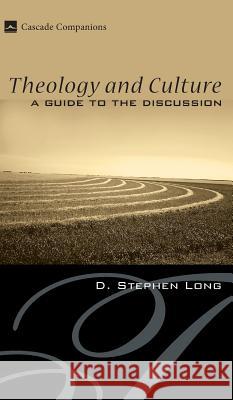Theology and Culture » książka
Theology and Culture
ISBN-13: 9781498210607 / Angielski / Twarda / 2008 / 124 str.
Theology and Culture
ISBN-13: 9781498210607 / Angielski / Twarda / 2008 / 124 str.
(netto: 121,72 VAT: 5%)
Najniższa cena z 30 dni: 127,45
ok. 16-18 dni roboczych.
Darmowa dostawa!
How can we speak about God without assuming that God is nothing but our own speaking, nothing but our cultures effort to name what cannot be named? How can we deny that our speaking of God is always culturally located? To answer these questions, we need to pay close attention to what we mean by culture, and how we use this very complex term both in our everyday language and especially in the language of faith. Culture is an exceedingly complex term that nearly everyone uses, but no one is sure what it means. This work examines various uses of the term culture in theology today.""Modernity, Steve Long tells us with his patented acerbity, is a broken record that never stops repeating its supposed novelty. If broken records require sharp, swift smacks to be knocked out of their tiresome grooves, Longs palm-sized book delivers a salutary slap that gets us back on track--and out of confused modern conceptualities that pit theology against culture. An excellent, masterly introduction to its topic.""--Rodney Clapp, author of A Peculiar People and Border Crossings""Too many guides pretend to a kind of theological neutrality that leads us nowhere. Steve Longs wonderful little book is a noted exception: here is a guide to the theological terrain that doesnt apologize for working with a compass. Providing a helpful survey of various schools of thought, the book also constitutes an argument for a particular theological understanding of culture. Long not only charts the territory, he also shows students how to plot a path through it. Ive already been commending it to my students."" --James K. A. Smith, Associate Professor of Philosophy, Calvin College ""Longs book is filled with deep insight and strategic provocation, both of which ought to push the theology and culture conversation beyond its unexamined truisms and self-satisfied dogmas. This is a book for people who take their theology without cream or sugar.""--Brent Laytham, Associate Professor of Theology and Ethics, North Park Theological Seminary""This work, as the title suggests, offers a birds eye view of the state of play between theology and culture. It provides a valuable summary of the contribution of Richard Niebuhr to the subject, but also suggests there is a need to revise Niebuhrs classifications in the wake of the rising influence of the theology of Henri de Lubac common to both the Radical Orthodoxy and Communio Catholic scholars. From de Lubacs perspective, Christ transforms cultures, rather than standing aloof outside them. The dynamics of this transformation is now a pressing theological concern which flows over confessional boundaries.""--Tracey Rowland, author of Culture and the Thomist Tradition: After Vatican II (Radical Orthodoxy)D. Stephen Long is professor of theology at Marquette University. He has published a number of works, including Divine Economy: Theology and the Market (2000), The Goodness of God: Theology, Church, and the Social Order (2001), John Wesleys Moral Theology: The Quest for God and Goodness (2005), and Calculated Future: Theology, Ethics, and Economics (2007).











